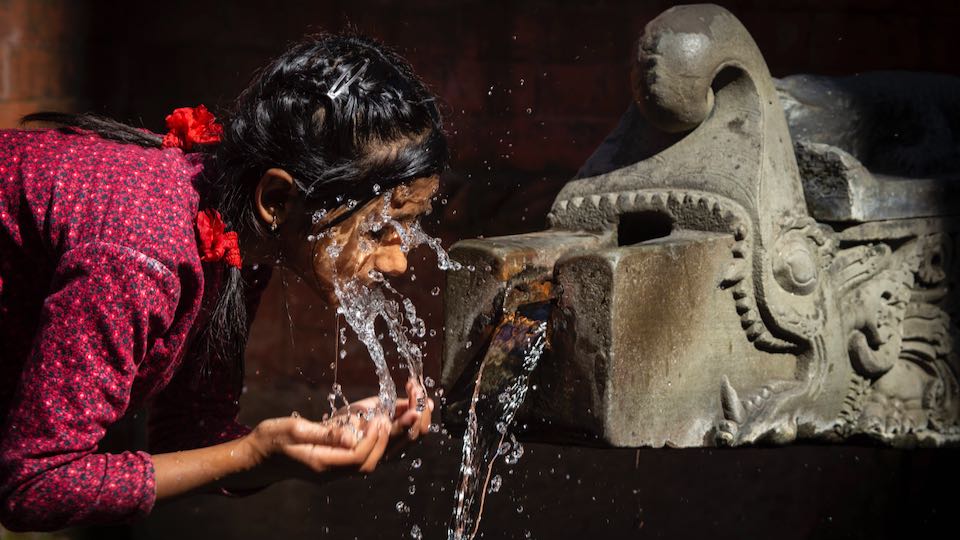UN warns of increasing water shortage

According to studies by the United Nations (UN), the global shortage of drinking water will continue to worsen. This is the result of increasing environmental problems and economic difficulties in connection with increased freshwater pollution, reads the UNESCO World Water Report at the start of the UN Water Conference in New York and on the occasion of World Water Day on Wednesday.
According to the report, two billion people worldwide – about one in four – already have no access to clean water. Between two and three billion people are already affected by water shortages for at least one month a year. In addition, 3.6 billion people lack access to safe sanitation.
In its own report, the UN Children’s Fund UNICEF points out that more than 1,000 children die every day as a result of contaminated drinking water and inadequate hygiene.
“Depending on the season, water will become scarce as a result of climate change, both where it is still abundant today – such as in Central Africa, East Asia and parts of South America – and more acutely where it is already scarce – such as in the Middle East and the Sahel,” UNESCO says.
According to the report, global water consumption is expected to increase by about one percent per year until 2050, as it has over the past 40 years. In poorer countries, the main risk is posed by poor water quality, while in industrialized countries, consumption through agriculture is problematic. As a result of the climate crisis, certain regions are increasingly exposed to extreme and prolonged droughts, with serious consequences for plant and animal life.
UNESCO expects the number of people living in cities who will face water shortages to grow from 930 million in 2016 to 1.7 to 2.4 billion in 2050.
A danger for children
According to UNICEF (in German), 190 million children are at risk in ten African countries alone. There, one-third of children have no access to clean water at home, two-thirds do not even have basic sanitation, one-fourth have to use the outdoors as a toilet, and three-fourths cannot wash their hands with soap and water at home.
The situation is most serious in the West and Central African countries of Benin, Burkina Faso, Cameroon, Chad, Côte d’Ivoire, Guinea, Mali, Niger, Nigeria and Somalia. Many of these states suffered from instability and armed conflict, he said, adding to the difficulty of children’s access to clean water and sanitation.
“Africa is facing a water catastrophe. While climate- and water-related shocks are increasing globally, nowhere else in the world are the risks to children worsening as much as in Africa,” warned UNICEF Program Director Sanjay Wijesekera. “Devastating storms, floods and historic droughts are already destroying facilities and homes, contaminating water sources, causing hunger crises and spreading disease.” Massive countermeasures are needed now to prevent the future from looking “much bleaker.”
Cooperation as a solution
UNESCO rates progress toward the UN Sustainable Development Goal and its sub-goals as insufficient. The organization speaks of “devastating interim results.” To achieve some goals, it now needs at least four times the speed of implementation.
“In view of limited financial resources, we must proceed in a coordinated manner and, for example, always think about water issues when it comes to climate protection,” warned Ulla Burchardt, board member of the German UNESCO Commission.
UNESCO calls on the international community to embrace cooperative approaches to water management such as water funds, where downstream consumers such as cities, businesses and utilities jointly invest in protecting upstream habitats to improve the quantity and quality of the water they draw. In addition, populations and stakeholders should be involved in planning and implementing water systems.
UNICEF advocates for increased investment in water, sanitation and hygiene. Funds earmarked for climate action should also be used and climate resilience strengthened. “Investing in climate-resilient water, sanitation and hygiene services is not only a matter of protecting children’s health today, but also of ensuring a sustainable future for generations to come,” said UNICEF Program Director Wijesekera. Communities most vulnerable to the water crisis need to be prioritized in policies and aid programs, he said.
“Water is security”
“Climate crisis, species extinction and pollution crisis are the three ecological crises of our time. They threaten our natural livelihoods, especially water as a resource,” said German Environment Minister Steffi Lemke (Greens). At the same time, she said, sustainable water management is a central key to solving global crises.
Foreign Minister Annalena Baerbock (Greens) warned of impending wars over access to scarce water sources in many parts of the world. The climate crisis is exacerbating the situation day by day, she said. That is why it is important to distribute water fairly, even across national borders: “Water is not only life, water is security.”
Environmental organizations such as WWF say the water conference launched Wednesday is “overdue.” Nowhere is species extinction progressing more rapidly than in rivers and wetlands.
Only action paper planned
The UN Water Conference is taking place in New York until Friday. It is the first major UN meeting since 1977 to focus exclusively on water. It will take stock by Friday of the halfway point of the International Water Action Decade from 2018 to 2028.
A particular focus is on the extent to which internationally agreed goals, including the UN Sustainable Development Goal on access to clean water for all, can be achieved. Dozens of ministers and also some heads of state and government have announced their attendance at the kick-off.
Nevertheless, no major agreement will be negotiated at the conference. Only a non-binding action paper is to be voted on. (dpa / hcz)